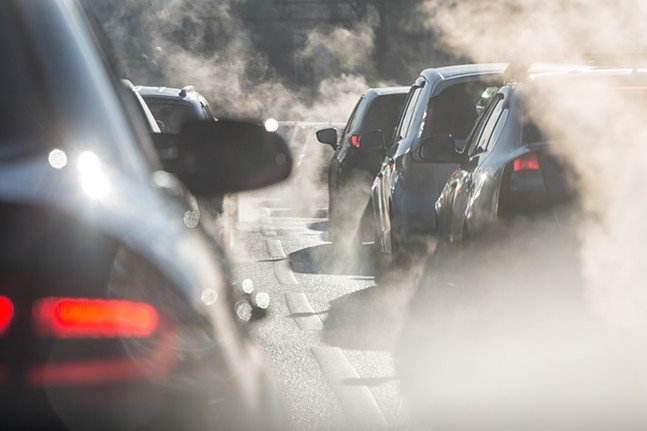A Code Orange alert means that the air quality may be unhealthy for sensitive groups, which includes children, elderly people, and people with respiratory problems. This is the first notable inversion of 2020, but over the holidays in December, there was a days-long inversion strong enough to lay a heavy smog over the city on Christmas Eve.
The temperature inversions are not necessarily the result of human activity, but the pollutants they trap certainly are. Emissions from vehicles get trapped on the surface, but so do pollutants from industrial facilities like the U.S. Steel's Clairton Coke Works. During the last inversion, and during the current one, air quality activists pointed out that U.S. Steel is allowed to emit significant amounts of pollutants daily, including during an inversion, which endangers the health of people who live in Clairton and the surrounding areas.
A recent study at Duquesne University found that asthma rates among children at Clairton Elementary School were almost double the rate of children in the state of Pennsylvania.
During December's inversion, the Allegheny County Health Department wrote a post on their Facebook page about the air quality and stated that they had been in communication with U.S. Steel about their emissions. When asked by Pittsburgh City Paper on Thursday whether the ACHD was in communication with U.S. Steel and other plants about their emissions during the inversion, they cited previous announcements about plans to reduce emissions.
"The increasing frequency, duration, and strength of temperature inversions in our area is something to which we are paying close attention. While current regulations do not provide for emission reductions beyond existing permit limits, we are in frequent contact with U.S. Steel and other pollution sources during these time periods to ensure compliance with existing permit limits," said ACHD interim director Ron Sugar in an email. "As previously announced, ACHD has also begun work on a new regulation to require industry to implement emission reduction plans during weather-related pollution episodes."
At an air quality protest on Fri., Jan. 10, Rachel Filippini of the Group Against Smog and Pollution emphasized the need for upgraded regulations because the current inversion-related rules don't include PM2.5, a measurement of particulate matter pollution that is often used as an air quality measure in other cities.
On Thu., Jan. 2, the ACHD announced that they would take steps to reduce emissions during temperature inversions, including emission reduction plans that can be implemented within 24 hours and better infrastructure to forecast inversion events. The ACHD did not give an exact time frame for when the regulations would change, but stated that the process "will not be quick," as it must go through an approval process, including committee review, a vote from the Board of Health, public comment, and county council approval.
The ACHD accepts air quality complaints over the phone, through email, or by mail.
Update, Fri., Jan. 24 at 1:15 p.m.: This story has been updated with additional information from the ACHD, and the headline has been changed to better reflect the story.


